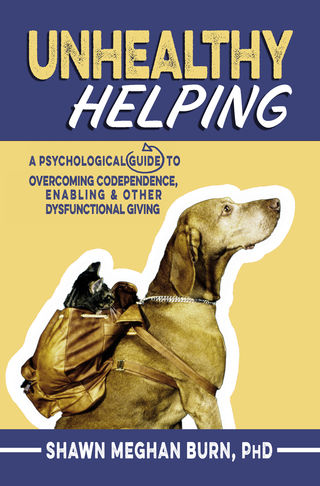Personality
Personality and Relationships Made in Codependence Hell
How Personality Traits May Predispose Us to Dysfunctional Helping Relationships
Posted September 18, 2013

Unhealthy helping often enables another’s underachievement, lack of responsibility, addiction, or poor mental or physical health. It tends to breed false dependence. It’s unsustainable in the long run due to its consumption of our physical, emotional, or financial resources. Instead of bringing us desired respect and strengthening our relationships, it often leads to disrespect, relationship strain, and conflict. In this blog I consider how two personality traits, “agreeableness” and “neuroticism,” sometimes predispose people to dysfunctional helping relationships, including codependent relationships. Before we go there, though, note that personality is only one of many influences on dysfunctional helping relationships and dysfunctional helping relationships vary (not all fit the pattern described here).
Psychologists have synthesized the many personality traits identified by research into five basic dimensions (known as the five-factor model of personality, or FFM). Many dysfunctional helpers probably score high on the FFM factor of agreeableness (“A”), which includes such traits as empathic, generous, kind, forgiving, sympathetic, trusting, considerate, and willing to help others.
People with a consistent pattern of dysfunctional helping are often strong empathic responders and experience intense feelings and emotional arousal when they perceive that someone is in need (they are “high-A”). Because they feel the other’s pain and want to alleviate it, they impulsively rescue and help. They also have trouble setting boundaries and terminating assistance because they feel badly about the hardship they may cause the other. The high-A person’s forgivingness means they can forgive broken promises, underperformance, and accept excuses. Due to their kindness and generosity, they are comfortable with relationships where they give more than they receive. In this way, their high-A traits can contribute to the development of dysfunctional helping relationships.
This may be especially likely when they meet up with “high-maintenance” individuals that are “low-A” (self-centered and largely indifferent or oblivious to other’s difficulties). Most of us are uncomfortable with long-term dependency and one-sided relationships. We seek independence and autonomy and we don't want to be a burden to others. But “low-A” people may be different, especially if they have features characteristic of certain personality disorders. For example, some of the most difficult dysfunctional helping relationships include a low-A taker that meets criteria for personality disorders like anti-social personality disorder (tends to act impulsively, has little regard for others, deceitful, has an exaggerated sense of self-importance); borderline personality disorder (requires others to soothe them, tends to feel victimized, has extreme emotions, tends to see problems as catastrophes); or personality disorders involving narcissist traits (feels entitled, has little empathy, blames others for their problems, arrogant). Researchers have linked low agreeableness to these personality disorders.
Neuroticism (“N”), includes such traits as whether a person is worry or anxiety-prone, and whether they have high or low self-esteem. Many dysfunctional helpers are probably “high-N.” When combined with the trait of agreeableness (particularly, empathy and forgivingness), high neuroticism (in the form of being a worrier with low self-esteem) can lure people into rescuing others from their self-imposed predicaments. This happens because they seek to alleviate the distress they experience from others' predicaments, and because their self-sacrifice makes them feel worthy and valuable, and wins other people’s love and approval, at least in the short run.
A helping relationship between an underfunctioning low-A person and a high-A/high-N person may be a match made in dysfunctional helping hell. They attract, activate, and amplify the other’s opposing traits, setting up a self-perpetuating dysfunctional helping cycle where helping breeds false dependence, incompetence, and the need for more help.

Our personalities do not doom us to unhealthy helping. You can check your empathy so it doesn’t lead to impulsive, unsustainable helping. You can tone down your forgivingness so that you don’t “cut too much slack” to people that don’t deserve it. You can proceed cautiously when entering a helping relationship with low-A others (use what you just learned to spot them). You can stop rescuing people who in most cases can muddle through fine without you. You can get therapy to develop healthier sources of self-esteem. And when what you thought what would be a short-term “hand-up” starts looking like a long-term “hand-out,” and your gut (and maybe your friends) are telling you that your help is unhealthy, you can take action to set healthy helping boundaries.
References

Based on ideas from my book . Available in paperback on Amazon and for available on Kindle, iBook, Nook, and Kobo e-readers.
Berry, J. W., Worthington, E. L., Parrott, L., O’Connor, L. E., & Wade, N. G. (2001). Dispositional forgivingness: Development and construct validity of the Transgression Narrative Test of Forgivingness (TNTF). Personality and Social Psychology Bulletin, 27, 1277-1290.
Costa, P. & Widiger, T.A. (2012). Personality Disorders and the Five-factor Model of Personality published by the American Psychiatric Association.
Digman, J.M. (1990). Personality structure: Emergence of the Five Factor Model. Annual Review of Psychology, 41, 417–440.
For my other blogs on the topic of codependence and unhealthy helping and giving see:
When Good Intentions Aren’t Enough
How to Help Someone In An Abusive Relationship
Are You A Codependent Beast of Others’ Burdens?
How Helping A Friend Can Go Horribly Wrong
12 Signs You’re Giving Too Much
Does Codependence Run In Your Family?
Codependent and Unhealthy Helping Mindtraps




